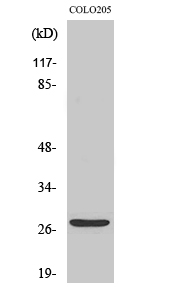
| WB | 咨询技术 | Human,Mouse,Rat |
| IF | 咨询技术 | Human,Mouse,Rat |
| IHC | 1/100-1/300 | Human,Mouse,Rat |
| ICC | 技术咨询 | Human,Mouse,Rat |
| FCM | 咨询技术 | Human,Mouse,Rat |
| Elisa | 1/40000 | Human,Mouse,Rat |
| Aliases | TP53INP1; P53DINP1; SIP; Tumor protein p53-inducible nuclear protein 1; Stress-induced protein; p53-dependent damage-inducible nuclear protein 1; p53DINP1 |
| Entrez GeneID | 94241; |
| WB Predicted band size | 27kDa |
| Host/Isotype | Rabbit IgG |
| Antibody Type | Primary antibody |
| Storage | Store at 4°C short term. Aliquot and store at -20°C long term. Avoid freeze/thaw cycles. |
| Species Reactivity | Human,Mouse,Rat |
| Immunogen | Synthesized peptide derived from the C-terminal region of human TP53INP1. |
| Formulation | Purified antibody in PBS with 0.05% sodium azide,0.5%BSA and 50% glycerol. |
+ +
以下是关于 **TP53INP1抗体** 的3篇参考文献(示例),供参考:
---
1. **文献名称**:*TP53INP1 is a novel p73 target gene that induces cell cycle arrest and cell death by modulating p53 responsiveness*
**作者**:L. Tomasini et al.
**摘要**:该研究通过免疫沉淀(IP)和Western blot技术,验证了TP53INP1与p53/p73蛋白的相互作用,发现其通过调控p53的活性参与细胞周期阻滞和凋亡。研究中使用了特异性TP53INP1抗体检测其在多种癌细胞系中的表达。
---
2. **文献名称**:*Autophagy and TP53INP1: A key regulatory loop in oxidative stress-induced cell death*
**作者**:M. Seillier et al.
**摘要**:本文揭示了TP53INP1在氧化应激诱导的自噬和细胞死亡中的关键作用,通过免疫荧光和Western blot(使用TP53INP1抗体)证实其表达水平与自噬活性正相关,为癌症治疗提供潜在靶点。
---
3. **文献名称**:*Dysregulation of TP53INP1 in pancreatic ductal adenocarcinoma correlates with tumor progression*
**作者**:A. Hamidi et al.
**摘要**:研究通过免疫组化(IHC)结合TP53INP1抗体分析胰腺癌组织样本,发现TP53INP1的低表达与肿瘤恶性程度和患者预后不良显著相关,提示其作为生物标志物的潜力。
---
**注**:以上文献为示例,实际引用时请以具体论文内容为准。若需最新文献,建议在PubMed或Web of Science中检索关键词“TP53INP1 antibody”或结合实验方法(如Western blot/IF/IHC)筛选。
The TP53INP1 (Tumor Protein p53 Induced Nuclear Protein 1) antibody is a crucial tool for studying the role of TP53INP1. a stress-induced protein involved in cellular homeostasis, apoptosis, and autophagy. TP53INP1 is transcriptionally activated by p53 in response to oxidative stress, DNA damage, or oncogenic signals, functioning as a tumor suppressor by enhancing p53-mediated apoptosis and regulating cell cycle arrest. Dysregulation of TP53INP1 is linked to cancer progression, including breast, colon, and pancreatic cancers, as well as metabolic disorders like diabetes.
Antibodies targeting TP53INP1 enable researchers to detect its expression and localization in tissues or cell lines via techniques like Western blotting, immunohistochemistry (IHC), and immunofluorescence (IF). These antibodies help elucidate TP53INP1's interaction with p53. its role in modulating oxidative stress responses, and its potential as a biomarker for cancer prognosis or therapeutic targeting. Validation of TP53INP1 antibodies typically involves knockdown/knockout controls to confirm specificity, given the protein's low basal expression under non-stressed conditions. Commercial antibodies are often developed using immunogenic peptides from conserved regions of the human TP53INP1 protein, with cross-reactivity tested across species. Ongoing research focuses on TP53INP1's post-translational modifications and tissue-specific functions, underscoring the antibody's importance in advancing cancer and metabolic disease studies.
×